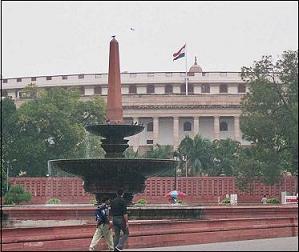Derailing Parliament to Seek Apology ….

Tukoji R Pandit
The second part of the Budget Session of Parliament has witnessed an unprecedented phenomenon—the ruling party obstructing proceedings to force its demand for apology by Congress leader Rahul Gandhi for allegedly lowering the image of the country during his talks delivered in London. According to the BJP, Rahul Gandhi sought intervention of foreign powers to save the crumbing structure of democracy in India.
The Indian government and its officials may decry to their heart’s contents the criticism of India in the foreign media, but it has not halted the trend of India getting a bad press in the international media.
Foreign countries, friends and foes alike, have always taken interest wherever democracy and citizens liberty has come under attack. Leaders have been travelling abroad to draw attention to suppression of democracy in their country. During the Emergency in India, many of the prominent Opposition leaders of the time had talked before foreign audiences to mobilise public opinion against the then government of India.
But come to think of it, does the Indian government really believe that a foreign power will swing into action on a request from an Opposition leader lamenting the loss of freedom? By BJP’s own narrative, India is now so strong that no foreign power is in a position to downgrade its position or challenge its policies. The powerful Western countries have, in any case, decided not to scrutinize Indian democracy.
The charge against Rahul Gandhi by the BJP may be viewed as serious, but Videos of his speeches in the UK show him stating clearly that it was an ‘internal matter’ for Indians to deal with.
The ruling party may be rewriting the rules by impeding Parliament proceedings unless Rahul Gandhi apologises. The BJP has made it a prestige issue and the Congress is equally opposed to the BJP demand.
A theory floating around is that the BJP has resorted to a diversionary tactic. It is dead against any discussion in Parliament on the controversial deals of tycoon Gautam Adani. Prime Minister Narendra Modi has maintained a studied silence on Adani saga ever since the US firm Hindenburg Research reported on Adani’s alleged stock manipulations to jump up the ladder of the richest in the world.
The government’s determination to avoid any discussion on L’affaire Adani has been evident by its refusal to appoint a Joint Parliamentary Committee (JPC) to probe the matter. Most JPCs appointed from the time of the UPA government—or even earlier–actually failed to support the allegations brought up by the Opposition. But the ruling party is still worried.
A JPC is dominated by members of the ruling party which means that the BJP members will be in majority. The conclusions of the JPC need not be embarrassing for the ruling party. But as they say the devil is in the details: The JPC can and does seek all manner of documents during its probe and if felt necessary can even summon ministers. The facts that will thus come to light can be politically damaging and can be—in fact, will be—used by the Opposition for political mileage.
Any cover up by the JPC will thus be pointless once the Opposition has authentic and powerful ammunition in its hand in the shape of authentic documents and statements.
It is surprising that the BJP does not realize that the different ways it uses to silence the Opposition and its leaders are ineffective because the Opposition messages do manage to reach a wide audience. The mainstream media may ignore dissent but this is the age of social media which can transmit words within seconds and minutes, not just across India but also to the wide world outside.
The BJP determinedly obstructing proceedings in Parliament has not done it any good. Opposition leaders, accused of disrupting the proceedings, have said—rightly– that it was for the ruling party to ensure smooth functioning of Parliament. Late Arun Jaitley had said that not allowing Parliament to function was a legitimate Opposition tactic ###
-
Book Shelf
-
 Book Review
DESTINY OF A DYSFUNCTIONAL NUCLEAR STATE
Book Review
DESTINY OF A DYSFUNCTIONAL NUCLEAR STATE
- Book ReviewChina FO Presser Where is the fountainhead of jihad?
- Book ReviewNews Pak Syndrome bedevils Indo-Bangla ties
- Book Review Understanding Vedic Equality….: Book Review
- Book Review Buddhism Made Easy: Book Review
- Book ReviewNews Elegant Summary Of Krishnamurti’s teachings
- Book Review Review: Perspectives: The Timeless Way of Wisdom
- Book ReviewNews Rituals too a world of Rhythm
- Book Review Marx After Marxism
- Book Review John Updike’s Terrorist – a review
-
-
Recent Top Post
-
 Commentaries
Impasse over BRI Projects in Nepal
Commentaries
Impasse over BRI Projects in Nepal
-
 CommentariesNews
Yet another Musical Chairs in Kathmandu
CommentariesNews
Yet another Musical Chairs in Kathmandu
-
 CommentariesTop Story
Spurt in Anti-India Activities in Canada
CommentariesTop Story
Spurt in Anti-India Activities in Canada
-
 NewsTop Story
Nepal: Political Stability Under Threat Again
NewsTop Story
Nepal: Political Stability Under Threat Again
-
 NewsTop Story
Accountability Tryst With 2024 Ballot….
NewsTop Story
Accountability Tryst With 2024 Ballot….
-
 NewsTop Story
What Would “Total Victory” Mean in Gaza?
NewsTop Story
What Would “Total Victory” Mean in Gaza?
-
 CommentariesTop Story
The Occupation of Territory in War
CommentariesTop Story
The Occupation of Territory in War
-
 CommentariesTop Story
Pakistan: Infighting in ruling elite intensifies following shock election result
CommentariesTop Story
Pakistan: Infighting in ruling elite intensifies following shock election result
-
 CommentariesTop Story
Proforma Polls in Pakistan Today
CommentariesTop Story
Proforma Polls in Pakistan Today
-
 CommentariesTop Story
Global South Dithering Away from BRI
CommentariesTop Story
Global South Dithering Away from BRI
-
AdSense code



















